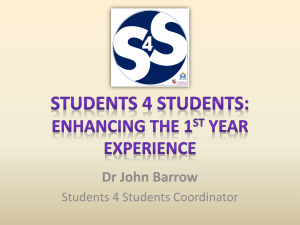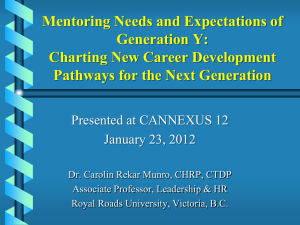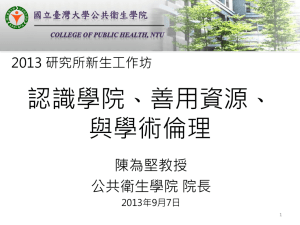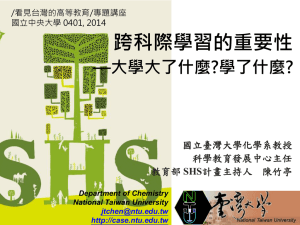mentoring
advertisement
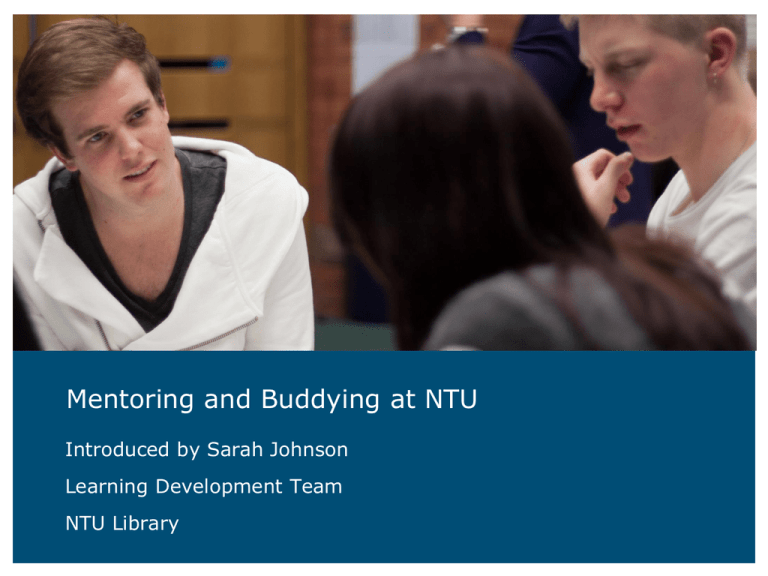
Mentoring and Buddying at NTU Introduced by Sarah Johnson Learning Development Team NTU Library Overview • 3.15 – 3.20 - Sarah Johnson with Dane Proctor Overview of Student Mentor scheme run in 6 Schools at NTU • 3.20 – 3.25 – Nic O’Brien - Inspire Mentoring Scheme (student opportunity) • 3.25 – 3.30 – Angela Vesey – Student Mentoring in Youth Studies • 3.30 – 3.35 – Tina Byrom – summary of the buddy scheme running in the School of Education • 3.35 – 3.40 – Leslie Arthur – Student Mentoring in ADBE • 3.40 – 3.45 – Andy Coppins and Esther Johnson - Evolve (ementoring - staff volunteering opportunity) plus NTU Work Experience Programme (staff opportunity to mentor work experience pupils) • 3.45 – 3.50 – Lindsay Davies – NTU Mentoring framework 08 April 2015 2 NTU Student Mentors Collaborative project What is the Student Mentor Scheme? Student Mentors – • Operate in Schools where there is little or no other form of one-toone writing support • Run drop-in sessions at City and Clifton every lunchtime • Run bookable sessions to support academic writing and maths • Offer one-to-one and small group sessions; drop-ins and writing and numeracy workshops within the library. • Act as positive role models for other students, helping them to develop their academic writing and maths skills. • Use questioning techniques to encourage independent learning, rather than a ‘doing it for you!’ approach. • Undergo NTU recruitment and selection, are trained and paid! 08 April 2015 4 Skills and qualities. . . Student Mentors are: • Reliable • Independent thinkers • Proactive • Good communicators • Active listeners • Approachable • Non-judgemental • Flexible • Committed • Organised • Producing a high standard of work! 08 April 2015 5 What can Mentors help students with? Academic Writing: Maths: • Understanding the assignment brief • Statistics and quantitative statistics • Planning your work • Algebra • Grammar • Graphs • Sentences and paragraphs • Trigonometry • Structuring the assignment • Probability • Referencing and plagiarism • T-tests • NOT Proofreading! • NOT Checking! 08 April 2015 6 Student participants . . . •Students who visit a Mentor may be: – Self-referred – Tutor-referred • According to our feedback the majority of students attend only one session . . . • Of those who responded, 95% of participants said that the Student Mentor had met their expectations • 85% of students said that confidence in their studies had increased as a result of seeing a Student Mentor 08 April 2015 7 For further information . . . • Visit the following web pages: www.ntu.ac.uk/studentmentors • Email us: ntustudentmentors@ntu.ac.uk Student Mentors are available to introduce the scheme at your Y1 inductions. • Book an appointment – ADBE – ARES – NBS – NLS – Education – SST 08 April 2015 adb.mentors palspod nbs.mentors nls.mentors EDU.AcademicPeerMentors pawsdesk/ smashdesk 8 Nicola O’Brien Schools, Colleges and Community Outreach Inspire Mentoring Scheme - (Student Opportunity) www.ntu.ac.uk/studentsinclassrooms NTU’s Schools, Colleges and Community Outreach • Support the progression to higher education of learners from disadvantaged backgrounds by raising awareness, aspirations and attainment • Enhance employability and higher education experience of NTU students by providing opportunities to engage with the wider community • Provide a co-ordinated central service which brokers outreach activity between the University and external schools, colleges and community organisations • Provide opportunities for personal and professional development for NTU staff through engagement with schools, colleges and community organisations • Achieved through a variety of strands of activity, including Partnership Managers, Students in Classrooms and NTU Volunteering www.ntu.ac.uk/community Students in Classrooms Paid opportunities for NTU students to work with local young people in a variety of roles, including the Inspire Mentoring Scheme • Mentors offer guidance, support and personal direction to pupils from the ages of 13 to 17 who have the potential to progress onto higher education (HE). • Guidance on topics such as routes into HE, revision and exam technique, planning skills, motivation, self-confidence and much more. The scheme aims to impact positively upon pupil attainment levels. • Students work with 4 mentees, one-to-one for 1 hour per week (11 sessions) in school environment (exact timings flexible to academic timetable) • Skills development opportunity for students (NTU Acceler8) • Raise NTU’s profile in the community The Student Mentoring Experience: BA Youth Studies, Division of Guidance, Youth Studies and Youth Justice. Angela Vesey Course Leader Background to the Scheme • First introduced in academic year 2010/11, with the aim of establishing ‘a student to student’ support system on the Year 1 BA Youth Studies Course. • Second and third year students on the Programme were invited to apply for mentoring training in the summer of 2010, and as a result of this seven students drawn from both year groups participated in a two day mentoring training programme in October 2010. This training was delivered by Sarah Johnson, Learning and Teaching Officer in CPLD. These students were allocated to a group of 10 first year students, and introduced to each other as part of the Research and Study Skills Module in November 2010, their remit was to provide on-going academic and personal support to students over the year. This training was repeated in summer 2011 with a second intake. 08 April 2015 13 Challenges to overcome • Course Leader providing an online dating service, matching mentor to mentee! • Frustrations of mentors…all ‘psyched’ up to support students but mentees not turning up for prearranged appointments. • Availability of timetables across years to identify a time for all students to initially meet. • Despite this……. 08 April 2015 14 Benefits of mentoring to mentees • A number of mentees commented that their mentor had been a useful starting point when unsure of a range of academic areas, the most commonly cited one being referencing and citation protocol. • One student explained how their mentor had helped them by discussing their assignment feedback with them. They also commented that their mentor had provided reassurance around a number of academic issues and had a positive impact on their overall year 1 experience. 08 April 2015 15 Benefits of mentoring to Mentors • Comments from the mentors; • I learnt how to support students with skills which allow them to develop their own methods of coping and learning, rather than helping them by doing it for them.. • Through mentoring I have taught myself a new way of thinking in regards to tackling an assignment and managing my time/stress and work. I feel proud that I contributed to the scheme as I feel that I helped my mentee. • I feel that the mentor program is helpful and has provided opportunities for myself to reflect upon my learning from the course from another perspective. 08 April 2015 16 Sharing Practice across the School • The Course Leader has met with colleagues in the Psychology Division to discuss the Youth Studies approach to mentoring and share recent evaluation from the students. • The Course experience with the School Learning and Development Coordinator who works closely with the Programme to provide additional support to students. 08 April 2015 17 Future? • There are clear benefits of ‘student to student’ support • Current review of mentoring provision as part of overall student support taking place as part of Portfolio Review. 08 April 2015 18 School of Education Buddy Scheme (SEBS) Dr Tina Byrom Rationale To build from the experiences of existing students to: – provide extra support for Year 1 students – aid the transition process into HE – facilitate space/s where Year 1 students can seek out advice Buddy Role •offer friendly support, advice and information •aid the settling-in process •sign-post to other services •minimum of two hours per month required •voluntary role Practicalities •each interested student completes an application form •buddies are trained •each ‘buddy’ compiles a profile •profiles are available to Year 1 students in a designated learning room •students contact buddy to arrange meeting or seek advice A Buddy is Not •teacher •counsellor •tutor •proof-reader •expert Student Mentoring in ADBE Leslie Arthur Achieve (e-mentoring, staff volunteering opportunity) NTU Work Experience Programme (staff opportunity to mentor work experience pupils) Andy Coppins and Esther Johnson www.ntu.ac.uk/volunteering Employee Volunteering and Community Involvement • Achieve E-mentoring – E-mentoring scheme linking staff with GCSE or ‘A’ level students in local Secondary Schools or Colleges – Develop a mentoring relationship via secure emails, which offer pupils a chance to speak to an adult – Helps to boost confidence, increase motivation, develop self awareness, discuss areas of work or issues relevant to them and provide practical support and advice. – Gives opportunity to work with schools in a wider area than face-to-face mentoring does – Volunteers are required to participate for up to an hour per week, based from a University computer. The times are variable and can be arranged on an individual basis. – Encourages pupils to think for themselves – it’s not a spoon feeding programme and the mentors encourage the pupils to think differently, explore alternatives and come to a resolution and action plan together. NTU Work Inspiration Scheme • Offer placements in 30 areas across NTU • from fashion to astronomy, finance to catering, business to equine, and many more • Hosted 52 students on placement in 11/12, from 35 schools • Benefits for colleagues: • • • • “opportunity for professional development” “assistance with tasks” “development of new resources” “satisfaction of being part of the students decision making process for their future career” • Benefits to students: • • • “gained insight into the working environment and structure of the working day” “gained confidence in myself” “enjoyed the insight that working here gave me, not only into the world of work, but also the life at university” • Raise aspirations and help inform decisions at critical stage of their lives • If you would like to offer a placement in your area please contact workexperience@ntu.ac.uk Introduction to the NTU Mentoring Framework Dr. Lindsay Davies Centre for Professional Learning and Development Aims of the Mentoring Framework To provide a package of support for Schools, Colleges & Services to facilitate them in running mentoring schemes where no previous mentoring activity has occurred or to enhance existing schemes via: • a robust process • a suite of resources • CPLD support for ‘owners’ who manage the mentoring scheme • CPLD support for evaluation of the mentoring scheme 08 April 2015 29 Defining ‘mentoring’ for the Framework Mentoring is an empowering, time bound relationship which stands outside of the line management (off-line) process and involves the development of specific knowledge, skills, behaviours and/or networks of a less experienced staff member through support by one who already possesses these attributes. These outcomes should be in support of enhancing professional performance in the pursuit of local or institutional goals. 08 April 2015 30 Structure of the Mentoring Framework •The framework is a 12 stage process of actions •Responsibilities allocated to CPLD and the specific Mentoring Scheme Owner •Each stage is supported by resources and documentation •Some stages have direct CPLD input such as mentor/mentee training and evaluation 08 April 2015 31 Next steps… •Continue to develop & refine resources/process •Disseminate outcomes from pilot scheme •Identify and operationalise further schemes •Map range of peer development activities •Create NOW learning room to support these 08 April 2015 32 Thank you! •Please feel free to visit the resource desk and ask questions •Contact information available on request •sarah.johnson@ntu.ac.uk 08 April 2015 33



